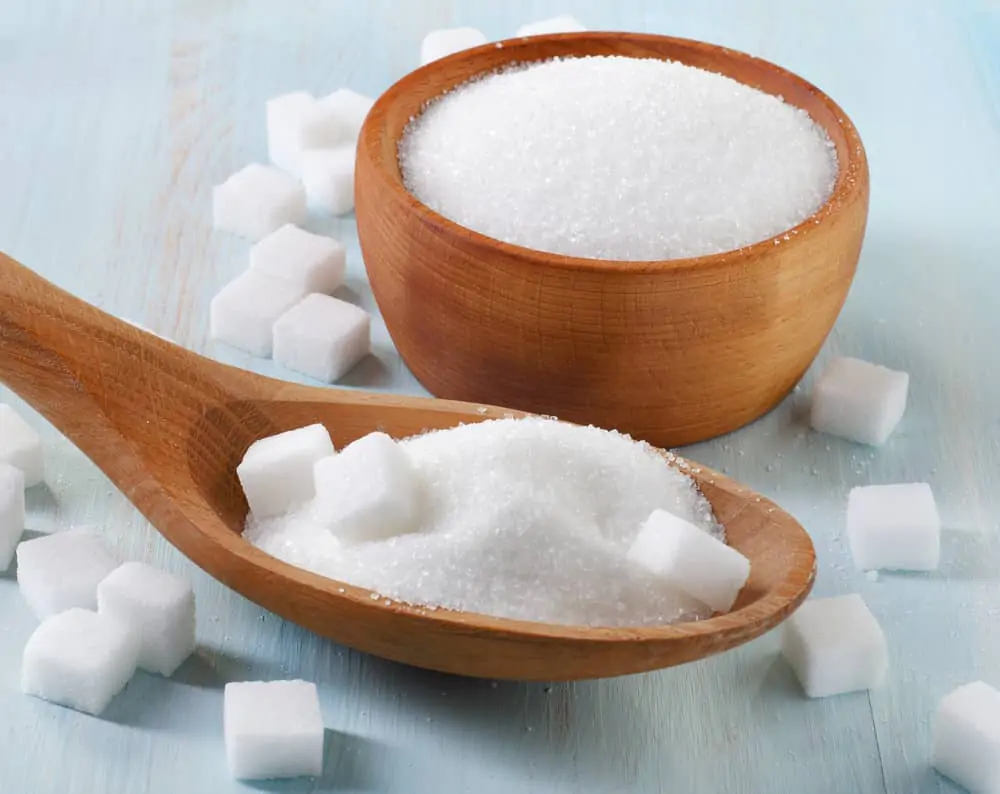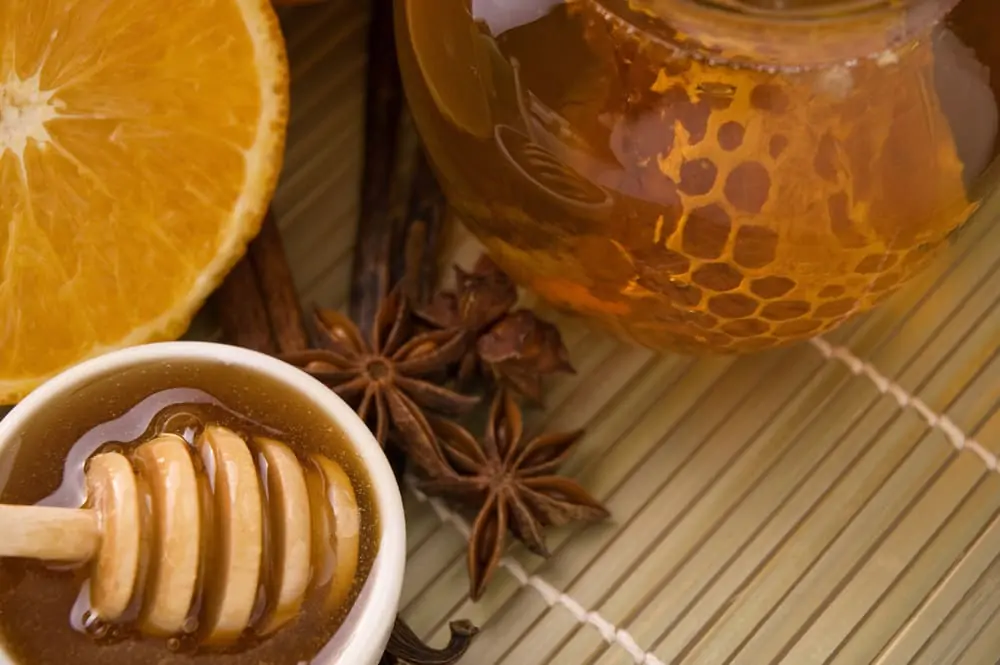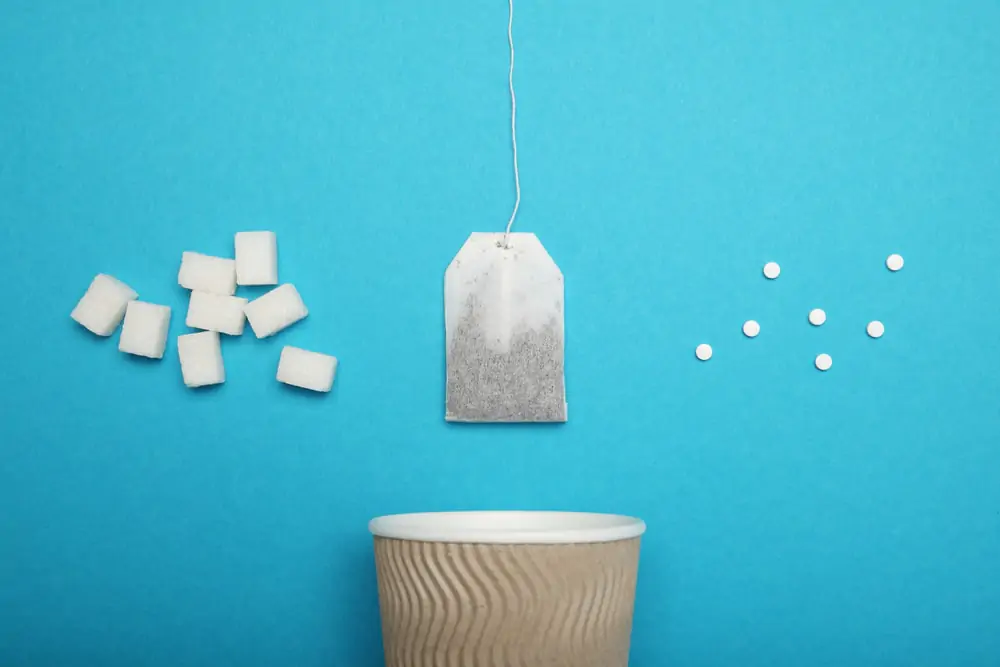From natural sugars to artificial sugars, there are many sugar alternatives that can be used to sweeten your coffee. What’s the best-tasting sugar substitute for coffee? We’ve put together a listicle to help answer that question.

Do you enjoy a cup of coffee but only when it’s sweetened with sugar? Coffee is said to have a ton of health benefits, such as reducing the likelihood of developing Type 2 diabetes. Though if you’re spooning table sugar, white sugar, or brown sugar into each cup, the positives are somewhat negated. But fret not, there are alternatives to sugar.
So, what’s the best-tasting sugar substitute for coffee? In this listicle, we’re going to layout a dozen sugar replacements for you to consider. And also give pause for thought around which is the healthiest.
- What Is Sugar?
- Natural Sweeteners
- Artificial Sweeteners
- 1. Honey
- 2. Coconut Sugar
- 3. Stevia
- 4. Aspartame
- 5. Sucralose
- 6. Saccharin
- 7. Agave Nectar
- 8. Cocoa Powder
- 9. Xylitol
- 10. Maple Syrup
- 11. Acesulfame Potassium (Ace-K)
- 12. Monk Fruit Extracts
- The Final Word on What’s the Best-Tasting Sugar Substitute for Coffee?
What Is Sugar?
Sugar, or sucrose, is a carbohydrate derived from sugar cane and beet. It’s a type of refined sugar. When consumed, it comes in the form of table sugar – also known as white sugar and granulated sugar.
In moderation, sugar is eaten as part of a healthy diet. But too much sugar can cause health issues such as obesity, diabetes, and tooth decay.
Other types of sugar include fructose (fruit sugar) and lactose (milk sugar).
Natural Sweeteners
If you’re considering sugar substitutes, natural sweeteners are a strong contender. They tend to have a flavor of their own and are not calorie-free. So, moderation is the key when using these as a sweetening product.

Artificial Sweeteners
These are synthetic sugar substitutes. They’re quite intense, so you only need to add a touch to sweeten coffee. And they’re also low-calorie or zero-calorie, meaning they may help with weight loss.
Artificial sweeteners provide a sweet taste, without increasing blood sugar levels. The FDA must review and approve all artificial sweeteners. But if in doubt, consult your doctor for advice.

Now let’s move on to specific sugar substitutes for coffee.
1. Honey
You’re thinking honey is more of a natural sweetener for tea, right? It can be used in coffee, too. It’s a natural source of energy and antioxidants and contains more nutrients than table sugar. But it’s also high in calories and has a distinct flavor.
2. Coconut Sugar
Coconut has so many uses, from drinking the juice of the fruit to using it as a cooking oil. Used as a natural sweetener, expect a slight taste of coconut. Some people see that as a bonus, others are not so keen.
Coconut sugar is unrefined, meaning it retains its minerals and vitamins. It also has a low glycemic index and a fructose content that’s the same as sugar.
What Is the Glycemic Index (GI)?
A relative ranking of carbohydrate levels in foods according to how they impact blood glucose levels.
Low and medium GI level foods are broken down more slowly by the body, causing a gradual rise in blood sugar over time. Pulses, wholegrain foods, and some fruit and vegetables fall into that category.
High GI foods are broken down quickly and cause a rapid rise in blood glucose levels. Examples include sugar and sugary foods, white bread and rice, and potatoes.
Back to our sugar alternatives listicle…
3. Stevia
You’d be forgiven for thinking this powdered substance is an artificial sweetener. In fact, it’s produced from a plant called stevia rebaudiana that’s native to Brazil and Paraguay.
Stevia is very low in calories. It was known for having a bitter aftertaste, but in more recent years researchers have tried to remedy that.
Studies have shown Stevia may have health benefits. These include lowering blood pressure and helping diabetics manage the disease.
A stevia-based brand you may recognize is Truvia.
4. Aspartame
This popular artificial sweetener is roughly 200 times sweeter than table sugar. It comes under the trade names Canderel, Equal, and NutraSweet. Aspartame has approval around the world but is a somewhat controversial additive. Why? There’s been discussion around its safety.
5. Sucralose
This artificial sweetener is calorie-free and doesn’t leave an aftertaste. Sucralose has been widely studied and is FDA-approved. It’s also a massive 400-700 times sweeter than sugar – be careful with the amount you use.
Splenda is the most common sucralose-based product on the market.
6. Saccharin
Sweet’n low is the brand name you’ll likely be aware of here. An artificial sweetener, it’s 300-400 times sweeter than regular sugar. The bitter or metallic aftertaste puts some people off.
7. Agave Nectar
This natural sweetener is derived from cacti. Although it contains high levels of fructose, agave nectar also has a low glycemic index.
Agave comes in liquid form, is sweeter than regular sugar, and has a long shelf life. Flavor-wise, it’s similar to honey but slightly less strong.
8. Cocoa Powder
Love drinking mochas? Then this option is the one for you. Add in its unsweetened form and enjoy that chocolatey taste, but without the sugar content.
9. Xylitol
You’ll see this on the supermarket shelves as XyloSweet, Ideal, and PolySweet, and it’s a sugar alcohol that’s low in calories. Coming in at 25% to 100% as sweet as sugar, this product is sold in granulated form and tastes like regular sugar.
In terms of health, sugar alcohols don’t cause tooth decay or cavities. It’s claimed they can help control weight and maintain diabetes. But they can cause bloating and digestive issues.
Another example of a sugar alcohol sweetener is erythritol.
10. Maple Syrup
How does adding maple flavor to your coffee sound? The syrup isn’t just for drizzling over pancakes, it can be used as a sweetener as well. It’s also high in antioxidants and mineral-rich, including zinc, iron, potassium, and calcium.
But this natural sweetener is also high in calories and strong in taste.
And be sure to check the label: don’t choose a brand that dilutes the product with high fructose corn syrup. Why? You’ll completely defeat the object of using a sugar substitute.
11. Acesulfame Potassium (Ace-K)
The brand names that fall under this artificial sweetener are Sunett and Sweet One. Acesulfame potassium contains zero calories and is around 200 times sweeter than sugar. Some people say it tastes bitter.
12. Monk Fruit Extracts
Monk fruit is a small, sub-tropical melon. As a natural sweetener, it’s intense and has undergone refinement. At 250-300 times sweeter than sugar, it’s a zero-calorie sweetener. Some people find there’s an aftertaste, so take care when adding. Brand names include Nectresse and PureLo.
The Final Word on What’s the Best-Tasting Sugar Substitute for Coffee?
Whether you’re sweetening black coffee, espresso, or milky coffee, there’s an array of sugar alternatives. Some have a distinct flavor, others leave an aftertaste. And as with many things, it comes down to personal choice.
As a coffee drinker, do you prefer a natural product over an artificial one? Do you have particular health issues you want to address? It’s worth experimenting to see which sugar-free substitutes suit you the best.

